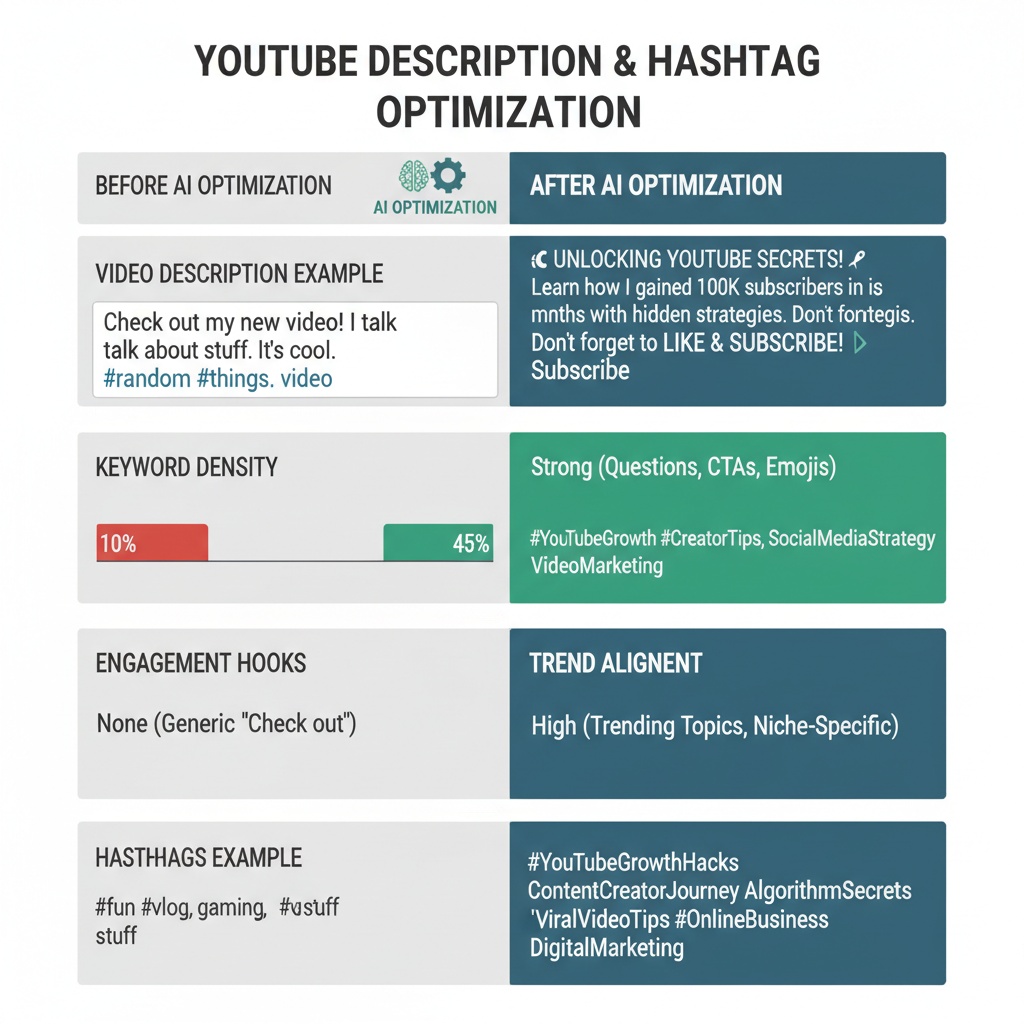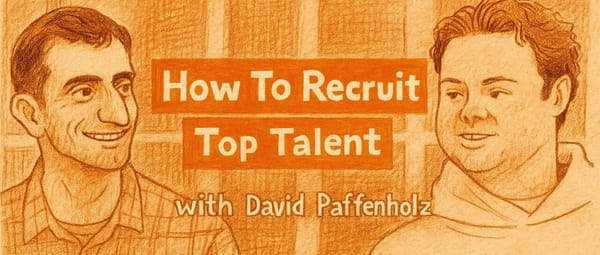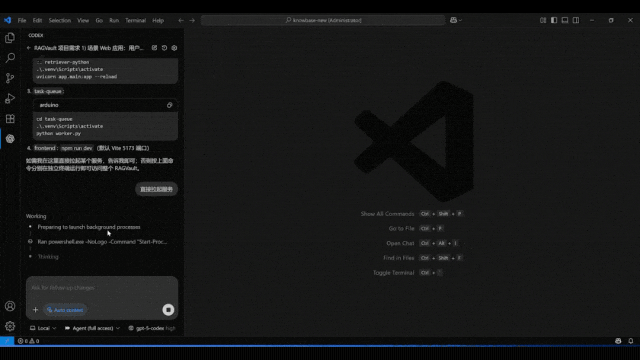AI Content Assistant for YouTube Descriptions and Hashtags
Learn how to use AI to create optimized YouTube descriptions and hashtags that boost SEO, increase discoverability, and attract more engaged viewers.

Understanding the Role of YouTube Descriptions and Hashtags in SEO
YouTube is one of the world’s largest search engines, and like Google, it relies heavily on metadata to index and rank videos. Two of the most powerful yet often under-optimized elements are YouTube descriptions and hashtags.
Your description provides context, keywords, and value statements that help YouTube’s algorithm understand your content. Hashtags enhance discoverability, signal topical relevance, and can even trend within your content category.

Without clear, keyword-rich descriptions and strategically chosen hashtags, even great videos can struggle to gain traction. Search engine optimization (SEO) on YouTube is not just about keywords—it’s about search intent, user engagement, and algorithmic ranking signals that influence visibility.
---
Choosing an AI Content Assistant Tool for YouTube Optimization
Not all AI tools are created equal. If your goal is to use a YouTube description and hashtag AI content assistant, focus on features such as:
- Specialized video metadata generation
- Context-aware keyword insertion
- Trend analysis for hashtags
- Bulk optimization support
Popular AI tools for YouTube optimization include:
- Jasper.ai
- ChatGPT with prompt engineering
- TubeBuddy’s AI-assisted features
- VidIQ Boost with description AI
Tip: Choose an AI that allows manual editing so you can refine results for authenticity, brand voice, and compliance.
---
Gathering Seed Keywords and Target Phrases in Your Niche
A successful YouTube description starts with the right vocabulary. Gather seed keywords by:
- Reviewing your niche’s top-ranking videos
- Using YouTube’s autocomplete to find trending searches
- Analysing competitor hashtags and tags
- Leveraging Google Trends for long-tail phrases
AI content assistants can expand your keyword list by generating semantically related terms. This ensures your video has language variety without keyword stuffing.
---
Using AI to Generate Engaging, Keyword-Rich YouTube Descriptions
Once your seed keywords are ready, prompt your AI content assistant to:
- Include primary and secondary keywords naturally
- Provide a compelling preview of the video’s value
- Offer clarity about what viewers will learn or experience
Example AI prompt:
Write a YouTube video description for a tutorial on vegan pasta recipes. Include keywords like 'vegan pasta', 'healthy recipes', 'easy cooking tips' without sounding repetitive. Add an engaging opening hook, a brief summary, and a call to action.---

Structuring Descriptions with Hooks, Value, and Calls-to-Action
A well-structured description can dramatically improve click-through rates. Only the first two lines are visible before the “Show More” link, so make them engaging.
Recommended Structure
- Hook (1–2 sentences): Capture curiosity quickly.
- Value statement: Explain what’s in it for the viewer.
- Expanded details: Provide further context about the content or creator.
- Call-to-action (CTA): Invite likes, comments, subscriptions, or website visits.
- Hashtags: Place at the bottom for a clean, professional look.
---
Generating AI-Assisted Hashtag Lists Based on Topic and Trends
Hashtags enhance both visibility and context. AI tools can analyse:
- Trending topics in your niche
- Related searched terms
- Audience-specific language usage
Prompt example:
Generate 15 YouTube hashtags for a channel focusing on minimalist home design trends in 2024.---
Best Practices for Combining Broad, Niche, and Trending Hashtags
To maximise discovery, diversify your hashtag strategy:
| Hashtag Type | Purpose | Example |
|---|---|---|
| Broad | Reach large audiences | #Design #Home |
| Niche | Target specific interest groups | #MinimalistLiving #JapandiStyle |
| Trending | Leverage current trends for quick exposure | #Spring2024Decor |
Pro Tip: Avoid irrelevant trending hashtags—they can harm both credibility and SEO.
---

Reviewing and Editing AI Output for Accuracy and Compliance
AI offers speed, but not guaranteed accuracy. Always review AI-generated descriptions and hashtags for:
- Factual accuracy
- Compliance with YouTube guidelines
- Consistency with brand tone and style
- Cultural and regional sensitivities
This protects your channel from misinformation and policy violations.
---
Testing Description Variations for Higher Click-Through and Watch Time
Testing ensures you learn what resonates best with your audience. Experiment with:
- Short vs. long descriptions
- Emotional vs. factual hooks
- Different keyword priorities
Track CTR (Click-Through Rate) and Average View Duration to measure improvements.
---
Using YouTube Analytics to Refine AI-Generated Metadata
Leverage YouTube Analytics to:
- Discover high-performing keywords in traffic sources
- Evaluate hashtag-driven traffic
- Assess whether specific description styles improve engagement
By feeding these insights back into your AI prompts, you can continuously improve results.
---
Avoid Keyword Stuffing and Off-Topic Hashtags
Overstuffing keywords can signal spam and reduce rankings. Keep usage natural and relevant. Remove hashtags that:
- Mislead the audience
- Don’t connect to the video content
- Are banned, restricted, or controversial
Remember: Quality and context outperform sheer quantity for sustainable SEO success.
---
Integrating AI into Your YouTube Publishing Workflow
To make AI part of a smooth publishing pipeline:
- Pre-production: Compile keywords and trending topics.
- Production: Craft precise description and hashtag prompts.
- Post-production: Review AI outputs and make adjustments.
- Publishing: Upload with optimised metadata.
- Post-launch: Monitor analytics and refine for next content.
This workflow saves time and ensures consistent optimisation across your channel.
---
Summary and Next Steps
A well-chosen YouTube description and hashtag AI content assistant can transform your video SEO strategy, but it must be paired with human oversight for nuance and authenticity. By combining AI efficiency with your unique voice, you align your content with both YouTube’s algorithm and audience expectations.
Start experimenting with AI prompts today, monitor your metrics, and continually adapt. The faster you close the loop between data and optimisation, the quicker your channel will grow. Ready to optimise your next upload? Apply these best practices and watch your discoverability improve.



